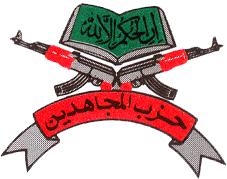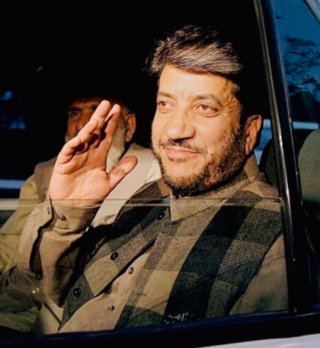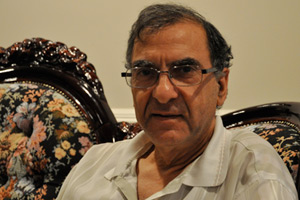Related Research Articles

Azad Jammu and Kashmir, abbreviated as AJK and colloquially referred to as simply Azad Kashmir, is a region administered by Pakistan as a nominally self-governing entity and constituting the western portion of the larger Kashmir region, which has been the subject of a dispute between India and Pakistan since 1947. Azad Kashmir also shares borders with the Pakistani provinces of Punjab and Khyber Pakhtunkhwa to the south and west, respectively. On its eastern side, Azad Kashmir is separated from the Indian union territory of Jammu and Kashmir by the Line of Control (LoC), which serves as the de facto border between the Indian- and Pakistani-controlled parts of Kashmir. Geographically, it covers a total area of 13,297 km2 (5,134 sq mi) and has a total population of 4,045,366 as per the 2017 national census.

Jammu and Kashmir was a region formerly administered by India as a state from 1952 to 2019, constituting the southern and southeastern portion of the larger Kashmir region, which has been the subject of a dispute between India, Pakistan and China since the mid-20th century. The underlying region of this state were parts of the former princely state of Jammu and Kashmir, whose western districts, now known as Azad Kashmir, and northern territories, now known as Gilgit-Baltistan, are administered by Pakistan. The Aksai Chin region in the east, bordering Tibet, has been under Chinese control since 1962.

Hizbul Mujahideen, also spelled Hizb-ul-Mujahideen, is a Pakistan-affiliated Islamist militant organisation that has been engaged in the Kashmir insurgency since 1989. It aims to separate Kashmir from India and merge it with Pakistan, and is thus one of the most important players in the region as it evolved the narrative of the Kashmir conflict by steering the struggle away from nationalism and towards jihadism.

The insurgency in Jammu and Kashmir, also known as the Kashmir insurgency, is an ongoing separatist militant insurgency against the Indian administration in Jammu and Kashmir, a territory constituting the southwestern portion of the larger geographical region of Kashmir, which has been the subject of a territorial dispute between India and Pakistan since 1947.

Operation Gibraltar was the codename of a military operation planned and executed by the Pakistan Army in the territory of Jammu and Kashmir, India in August 1965. The operation's strategy was to covertly cross the Line of Control (LoC) and incite the Muslim-majority Kashmiri population's uprising against the Indian Government. The military leadership believed that a rebellion by the local Kashmiri population against Indian authorities would serve as Pakistan's casus belli against India on the international stage.

The Kashmir conflict is a territorial conflict over the Kashmir region, primarily between India and Pakistan, and also between China and India in the northeastern portion of the region. The conflict started after the partition of India in 1947 as both India and Pakistan claimed the entirety of the former princely state of Jammu and Kashmir. It is a dispute over the region that escalated into three wars between India and Pakistan and several other armed skirmishes. India controls approximately 55% of the land area of the region that includes Jammu, the Kashmir Valley, most of Ladakh, the Siachen Glacier, and 70% of its population; Pakistan controls approximately 30% of the land area that includes Azad Kashmir and Gilgit-Baltistan; and China controls the remaining 15% of the land area that includes the Aksai Chin region, the mostly uninhabited Trans-Karakoram Tract, and part of the Demchok sector.

Kashmir Solidarity Day or Kashmir Day is a national holiday observed in Pakistan on 5 February annually. It is observed to show Pakistan's support and unity with the people of Indian-administered Jammu and Kashmir and Kashmiri separatists' efforts to secede from India, and to pay homage to the Kashmiris who have died in the conflict. Solidarity rallies are held in the Pakistani-administered territory of Azad Jammu and Kashmir, Pakistan and by Mirpuri Kashmiris in the United Kingdom.

Sardar Sikandar Hayat Khan was an Azad Kashmiri politician who served as the Prime Minister of Azad Kashmir for two non-consecutives terms. He also served as the President of Azad Kashmir twice. He was the longest-serving prime minister of Azad Kashmir, having served a total of more than 10 years across two tenures.

United Kashmir People's National Party (UKPNP) is a political party that advocates for an independent, united, and socialist Kashmir.

Shabir Ahmad Shah popularly known as Shabir Shah, in Kadipora, Anantnag, Kashmir is the founder and president of the Jammu and Kashmir Democratic Freedom Party (JKDFP), one of the main separatist political organizations seeking "right of self-determination" to Jammu and Kashmir.

Chaudhry Ghulam Abbas was a leading politician of Jammu and Kashmir and the President of the Muslim Conference party. After his migration to Pakistan administered Kashmir in 1947, he became the head of the Azad Kashmir (AJK) government.

Syed Ghulam Nabi Fai is an American citizen of Kashmiri origin, and a Jamaat-e-Islami activist. He founded the organisation Kashmiri American Council in the United States and carried out lobbying on behalf of Kashmiri separatist groups and the Government of Pakistan. In 2011, the US government stated that this was a front group for Pakistan's Inter-Services Intelligence (ISI).
Human rights abuses in Jammu and Kashmir range from mass killings, enforced disappearances, torture, rape and sexual abuse to political repression and suppression of freedom of speech. The Indian Army, Central Reserve Police Force (CRPF), and Border Security Personnel (BSF) have been accused of committing severe human rights abuses against Kashmiri civilians. According to Seema Kazi, militant groups have also been held responsible for similar crimes, but the vast majority of abuses have been perpetrated by the armed forces of the Indian government.

Khurram Parvez is a Kashmiri human rights activist. He is the chairperson of Asian Federation Against Involuntary Disappearances (AFAD) and the program coordinator of Jammu Kashmir Coalition of Civil Society. Khurram is a recipient of the 2006 Reebok Human Rights Award. Parvez was included in Time's annual list of the 100 most influential people in 2022.
The Kashmir conflict has been beset by large scale usage of sexual violence by multiple belligerents since its inception.
Women's rights in Jammu and Kashmir is a major issue. Belonging to a patriarchal society, they have had to fight inequality and routine discrimination. Since the onset of insurgency in 1988, rape has been leveraged as a popular 'weapon of war' by Indian security forces. Separatist militants have also committed rapes, which remain under-researched but are not comparable in scale to that of the Indian state forces. Women's rights in Kashmir Valley has major issues as there is harassment of young muslim women participating in sports activities, demands of dowry after marriage, domestic violence incidents, acid attacks on women, and men being generally taken in a higher regard than women. Many small organisations have been formed to struggle for women's rights in Jammu and Kashmir.

Media in Jammu and Kashmir comprises a diverse landscape of print, electronic and digital media outlets. The region is served by a variety of newspapers, television channels, radio stations, and online news platforms, reflecting the cultural and linguistic diversity of the area.

On 5 August 2019, the Government of India revoked the special status, or autonomy, granted under Article 370 of the Indian Constitution to Jammu and Kashmir—a region administered by India as a state which consists of the larger part of Kashmir which has been the subject of dispute among India, Pakistan, and China since 1947.

Qazi Shibli is a Kashmiri journalist and editor of The Kashmiriyat, a digital newspaper covering general, political and human rights news from Jammu and Kashmir. In December 2019, Shibli's detainment ranked fifth on Time's list of "10 most urgent threats to press freedom."
References
- ↑ Website, YFK.org.pk (2013). "Launch of first Kashmir lobby group". YFK. Retrieved 19 June 2021.
- ↑ News Agency, INP (31 August 2013). "YFK Launching: No Compromise on Self-Determination". Pakistan Observer. Retrieved 19 June 2021.
- ↑ Website, RefWorld (15 April 2016). "New Generation of Militants Emerging in Kashmir". United Nations High Commission for Refugees. Retrieved 19 June 2021.
- ↑ Carey, Keith (2019). "Kashmiri (Muslim traditions) in Pakistan". Joshua Project. Retrieved 19 June 2021.
- ↑ Direct, Science (July 2008). "Genetic analysis of Kashmiri Muslim population living in Pakistan". Legal Medicine. 10 (4): 216–219. doi:10.1016/j.legalmed.2007.12.005. PMID 18328763 . Retrieved 19 June 2021.
- ↑ Website, YFK (2014). "Who Funds YFK?" . Retrieved 19 June 2021.
- ↑ Expanded online survey conducted for the term 'YFK Kashmir' on Microsoft Bing and Google Search on 24 & 23 June 2021. [Results are not shared here due to Wikipedia search result link rules].
- ↑ Saqib, Mehreen (30 July 2020). "YFK brings Journalists together to discuss lockdown restrictions". Baaghi TV. Retrieved 19 June 2021.
- ↑ Website, YFK (26 February 2015). "YFK-EU Discuss Kashmir". YFK. Retrieved 19 June 2021.
- ↑ "Australian politician gets briefing on Kashmir issue". Pakistan Today. 1 September 2018. Retrieved 19 June 2021.
- ↑ New desk, YFK (6 December 2018). "UN and Government officials join Pakistani activists in marking Volunteer Day". YFK. Retrieved 21 June 2021.
- ↑ News Desk (April 2020). "Kashmiri and international journalists discuss reporting under lockdown restrictions". YFK Official Facebook Page. Retrieved 19 June 2021.
- ↑ News Desk (22 April 2019). "Developing Effective Leadership Skills". YFK Official Facebook Page. Retrieved 19 June 2021.
- ↑ News Desk (31 October 2020). "Be A Successful Lobbyist In Career & Life" . Retrieved 19 June 2021.
- ↑ New Agency, INP (31 August 2013). ""Sardar AsadUllah Khan, a Pakistani Kashmiri"". Pakistan Observer. Retrieved 19 June 2021.
- ↑ Institute, KIIR (2019). "Chairman-Altaf Hussain Wani". KIIR. Retrieved 19 June 2021.
- ↑ Trunkwalas, WorldGroup (2015). "QASWAR SAEED MIRZA, M.A LLB AND FORMER DIRECTOR GENERAL PUBLIC RELATION , PRESIDENCY OF PAKISTAN". World Group. Retrieved 19 June 2021.
- ↑ Mirza, Muhammad Omar (5 January 2020). "Nawabzada Riaz Hussain Qureshi, son of Governor Punjab Nawabzada SAdiq Hussain Qureshi". Geni.com. Retrieved 19 June 2020.
- ↑ Zaafir, Muhammad Saleh (7 May 2018). "Peace seminar: India protects its soldiers". The News International. Retrieved 27 May 2022.
- ↑ Qehremanlari, Veten (12 June 2021). "Pakistanda Milli Qurtuluş Günü qeyd olunub". vetenqehremanlari.az. Retrieved 3 July 2021.
- ↑ International, The News (6 December 2017). "YFK presents Kashmir issue in a global conference". The News International. Retrieved 3 July 2021.
- ↑ Department, Science and Information Technology (4 May 2020). "Sardarzada Mir Umair Jan Muhammad Hasni". Government of Balochistan. Retrieved 19 June 2021.
- ↑ Official website, YFK (2018). "YFK lobbyist Shaista Safi". YFK. Retrieved 20 June 2021.
- ↑ news ahency, KMS (12 March 2020). "Shaista Safi warns UN HRC of genocide of Kashmiris". Pakistan Observer newspaper. Retrieved 20 June 2021.
- ↑ Jammu Kashmir, Tehreek-e-Hurriyet (2019). "Ghulam Muhammad Safi-Profile". THJK. Retrieved 21 June 2021.
- ↑ Official website, PAGE (2021). "Maria Iqbal Taran-Pakistan Alliance for Girls Education". PAGE. Retrieved 20 June 2021.
- ↑ Official website, MOFA (2021). "Deputy Director at the Counter Terrorism Division, Ministry of Foreign Affairs, Government of Pakistan". Ministry of Foreign Affairs. Retrieved 20 June 2021.
- ↑ Zaafir, Muhammad Saleh (13 July 2020). "YFK remembers sacrifices of Kashmiris on Martyrs Day". The News International. Retrieved 27 May 2022.
- ↑ Admin, YFK (2014). "Our Team page". YFK Official Website. Retrieved 27 May 2022.
- ↑ Khurshid, Tooba (30 May 2016). "Book Launch for "Secrets of the Kashmir Valley". Executive director YFK participated". ISSI website. Retrieved 21 June 2021.
- ↑ Mir, Hilal (26 May 2016). "The Kashmir reading list: 11 books to understand the conflict". Hindustan Times. Retrieved 21 June 2021.
- ↑ HUSSAIN, IMTIYAZ (18 September 2019). "8 Books to Help You Understand the Kashmir Conflict: Nonfiction and novels that illuminate the dispute over the region". Electric Literature. Retrieved 21 June 2021.
- ↑ Zaafir, Muhammad Saleh (2016–2021). "Various interviews, reports, and newspaper statements by YFK officials and activists". The News International. Retrieved 21 June 2021.
- ↑ A general non-academic survey of comments and replies on various YFK social media pages and accounts, conducted between 27 February 2021, to 25 May 2021, covering the 2014–2020 period.
- ↑ Saeed, Saim (5 August 2019). "Trump stumbles into Kashmir showdown". Politico EU edition. Retrieved 23 June 2021.
- ↑ Ratcliffe, Rebecca (23 July 2019). "Fury in India over Donald Trump's Kashmir claims" . Retrieved 23 June 2021.
- ↑ "Trump's formula on Kashmir unacceptable: Punjab governor". Daily Times newspaper. 6 February 2020. Retrieved 23 June 2021.
- ↑ Official website, YFK (4 February 2021). "Statement by AHMED QURAISHI | Executive Director, YFK-International Kashmir Lobby Group". YFK. Retrieved 23 June 2021.
- ↑ Web administrator, ISSI (4 February 2021). "PRESS RELEASE – "Pakistan Stands with Kashmiris"". ISSI. Retrieved 23 June 2021.
- ↑ Official website, YFK (23 March 2014). "The Unfinished Agenda of Pakistan's Independence". YFK. Retrieved 21 June 2021.
- ↑ Media Office, ISPR (3 June 2015). "Major General Asim Saleem Bajwa, Director-General of Inter-Services Public Relations". ISPR. Retrieved 21 June 2021.
- ↑ Website, Zee News (3 June 2015). "Kashmir is 'unfinished agenda of partition': Pak Army Chief Raheel Sharif". Zee News. Retrieved 21 June 2021.
- ↑ New desk, YFK (10 March 2018). "Kashmir Delegation Screens A Short Film At UN Paying Tribute To Asma Jahangir". YFK. Retrieved 21 June 2021.